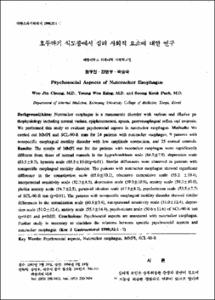KUMEL Repository
1. Journal Papers (연구논문)
1. School of Medicine (의과대학)
Dept. of Internal Medicine (내과학)
호두까기 식도증에서 심리 사회적 요소에 대한 연구
- Keimyung Author(s)
- Chung, Woo Jin; Kang, Young Woo; Park, Soong Kook
- Department
- Dept. of Internal Medicine (내과학)
- Journal Title
- Korean Journal of Gastroenterology
- Issued Date
- 1998
- Volume
- 32
- Issue
- 1
- Abstract
- Background/Aims: Nutcracker esophagus is a manometric disorder with various and illusive pathophysiology including normal variant, epiphenomenon, spasm , gastroesophageal reflux and neurosis. We performed this study to evaluate psychosocial aspects in nutcracker esophagus. Methods: We carried out MMPI and SCL-90-R tests for 24 patients with nutcracker esophagus, 9 patients with nonspecific esophageal motility disorder with low amplitude contraction, and 25 normal controls. Results: The results of MMPI test for the patients with nutcracker esophagus were significantly different from those of normal controls in the hypochondriasis scale (64.5+-7.9), depression scale (63.5+9.7), hysteria scale (65.5+-10.0)(p<0.01). Similar differences were observed in patients with nonspecific esophageal motility disorder. The patients with nutcracker esophagus showed significant difference in the somatization scale (65.0+-10.2), obsessive compulsive scale (55.2 +-10.4), interpersonal sensitivity scale (52.3+-8.5), depression scale (59.0+-10.9), anxiety scale (59.3+-10.0), phobia anxiety scale (54.7+-2.5), paranoid ideation scale (47.3+-8.2), psychoticism scale (53.5+-7.7) of SCL-90-R test (p<0.01). The patients with nonspecific esophageal motility disorder showed similar differences in the somatization scale (60.6+-3.6), interpersonal sensitivity scale (51.0+-12.4), depression scale (51.0+- 12.4), anxiety scale (55.1+-14.9), psychoticism scale (50.6+-11.6) of SCL-90-R test (p<0.01 and p<0.05). Conclusions: Psyehosocial aspects are associated with nutcracker esophagus. Further study is necessary to elucidate the relations between specific psychosocial aspects and nutcracker esophagus.
목적: 호두까기 식도증 환자에서 심리 사회적 요소를 평가하고자 하였다. 대상 및 방법: 계명대학교 동산의료원 소화관운동 클리닉에서 식도내압검사로 진단된 호두까기 식도증과 비특이적 식도 운동 질환환자, 정상 대조군에서 다면적 인성검사(MMPI)와 간이 정신 신경검사(SCL-90-R)를 시행하였다. 결과: 호두까기 식도증 환자는 40대가 가장 많았고 남녀 비는 1:2이었으며 흉통 8예, 흉부 이물감 6예, 연하곤란 5예이었으며 흉통과 흉부 이물감이 1예이었다. 다면적 인성검사상 호두까기 식도증에서는 건강 염려증 척도(64.5±7.9), 우울증 척도(63.5±9.7), 히스테리 척도(65.5±10.5)에서 유의하였다(p<0.05). 간이 정신 신경검사에서도 호두까기 식도증에서는 신체화장애증 척도(65.0±10.2), 강박증 척도(55.2±10.4), 대인민감증 척도(52.2±8.5), 우울증 척도(59.0±10.9), 불안증 척도(59.3±10.0), 공포증 척도(54.7±2.5), 경조증 척도(47.3±8.2), 정신병증 척도(53.5±7.7)에서 유의하였고(p<0.01), 비특이성 식도 운동 질환 환자에서는 신체화 장애증 척도(60.6±3.6), 대인민감증 척도(51.0±12.4), 우울증 척도(51.0±12.4), 불안증 척도(55.1±14.9), 정신병증 척도(50.6±11.6)에서 유의한 소견을 보였다(p<0.01, p<0.05). 결론: 호두까기 식도증 환자에서 심리사회적 요소가 연관되어 있으나, 호두까기 식도증의 병태생리와 심리 사회적 요소와의 연관성 혹은 인과관계에 대해서는 더욱 많은 연구가 필요하겠다.
- Alternative Title
- Psychosocial Aspects of Nutcracker Esophagus
- Publisher
- School of Medicine
- Citation
- 정우진 et al. (1998). 호두까기 식도증에서 심리 사회적 요소에 대한 연구. Korean Journal of Gastroenterology, 32(1), 1–7.
- Type
- Article
- ISSN
- 1598-9992
- Appears in Collections:
- 1. School of Medicine (의과대학) > Dept. of Internal Medicine (내과학)
- 파일 목록
-
-
Download
 oak-bbb-1841.pdf
기타 데이터 / 562.67 kB / Adobe PDF
oak-bbb-1841.pdf
기타 데이터 / 562.67 kB / Adobe PDF
-
Items in Repository are protected by copyright, with all rights reserved, unless otherwise indicated.